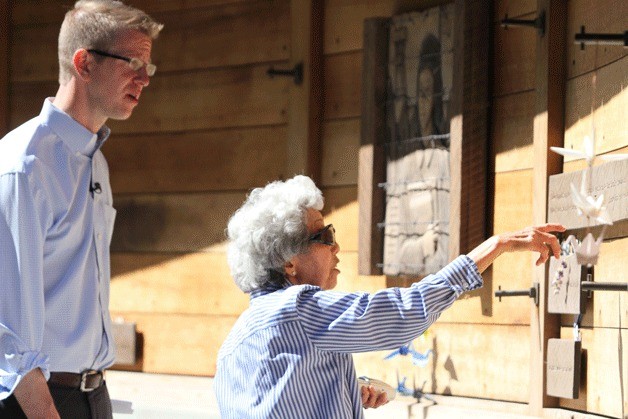The U.S. House of Representatives unanimously passed a bill Wednesday by Representative Derek Kilmer to officially recognize a new name for the Bainbridge Island memorial to Japanese Americans forced from their homes during World War II.
The legislation ensures the site is properly recognized as the Bainbridge Island Japanese American Exclusion Memorial.
“I am pleased that the House was able to come together and pass legislation to properly recognize the unfair and unjust treatment of Japanese Americans during World War II,” said Kilmer, a Gig Harbor Democrat and congressman from Washington’s 6th District.
Kilmer made his first visit to the Bainbridge memorial, located at the former Eagledale ferry dock where Japanese Americans were taken from the island, on Aug. 4.
“The moving and heartbreaking stories chronicled at the Bainbridge memorial, describing how families were rounded up and forcibly removed from their homes, remind us that we must always be vigilant in fighting prejudice and discrimination,” Kilmer said.
Bainbridge groups – including the Bainbridge Island Japanese American Community and the Japanese American Exclusion Memorial Association – and residents pushed for the renaming of the National Historic Site, previously referenced in federal law as the Bainbridge Island Japanese American Memorial, to better reflect the history it commemorates. Kilmer worked closely with stakeholders and the National Park Service to clarify how to appropriately change the name and to ensure that the new name would be fully recognized in federal law.
He spoke on the importance of passing this bill on the House floor earlier this week.
The Bainbridge Island Japanese American Exclusion Memorial is the only national memorial to the internment of Japanese Americans not located at an incarceration site. Kilmer met with local Japanese American survivors of World War II internment camps at the Bainbridge Island memorial in early August, and was joined at the site by Johnpaul Jones, the architect who designed the memorial and recently received a National Humanities Medal from President Obama.
On Feb. 19, 1942, President Franklin Roosevelt signed an Executive Order allowing Japanese Americans to be excluded from important military areas. Bainbridge Island became the first place to be deemed an “exclusion zone” by the United States government and 227 Bainbridge Island Japanese Americans were forced to leave, boarding a ferry at Eagledale to begin a journey that would end in internment camps.
Residents of the island used the local paper, the Bainbridge Review, to stay in touch with those who were interned.
The paper’s publishers, Walt and Milly Woodward, openly opposed the removal of Japanese Americans from Bainbridge Island, making them one of the only West Coast newspaper publishers to oppose the law.



